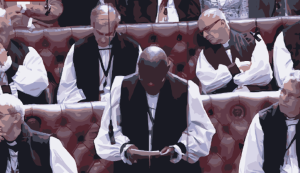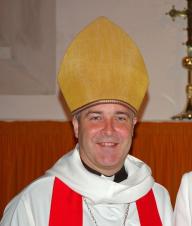Twenty-six Anglican bishops are given seats as of right in the House of Lords.
The UK is the only western democracy which reserves seats for clerics in its legislature.
This is unfair, undemocratic and undesirable. It's time to abolish the bishops' bench.
Two archbishops and 24 bishops of the Church of England currently have automatic seats in the House of Lords. They are sometimes known as 'the lords spiritual'.
We campaign for a secular upper house with no specific religious representation, whether of Christian denominations or any other faiths. In a secular state no religion or its leaders should have a privileged role in the legislature.
Any serious proposals to reform the House of Lords must address the unjustified privilege of the bishops' bench.
62% of Brits think no religious clerics should have an automatic right to seats in the House of Lords.
After over a century of decline in religious attendance in Britain, the claim that bishops — or any other religious representatives — speak for any significant constituency is not warranted. Less than 1% of the British population now attend Anglican services on the average Sunday.
In addition, the presence of religious leaders amounts to double representation of religious interests as many peers already identify themselves as being religiously motivated. Retired religious leaders are often appointed as peers.
Bishops do not have any "special moral insight" unavailable to everybody else. The idea that bishops or any other 'religious leaders' have any monopoly on issues of morality is offensive to many non-religious citizens. Those who profess no religion are no less capable of making moral and ethical judgements.
In an increasingly secular society the role of religious representatives in our legislature has become irrelevant, and has stood in the way of progressive legislation.
Take action!
1. Write to your MP
Ask your MP to help end the archaic, unfair and undemocratic bishops’ bench in the House of Lords.
2. Share your story
Tell us why you support this campaign, and how you are personally affected by the issue. You can also let us know if you would like assistance with a particular issue.
3. Join the National Secular Society
Become a member of the National Secular Society today! Together, we can separate religion and state for greater freedom and fairness.
Latest updates
Peer proposes bill to abolish bishops’ bench in House of Lords
Posted: Fri, 20 Dec 2019 14:22
The National Secular Society is backing a private member's bill which would end the automatic right of Church of England bishops to sit in the House of Lords.
Liberal Democrat peer Dick Taverne, an NSS honorary associate, has presented a bill which would end C of E bishops' automatic right to sit as legislators. The bill was drafted with NSS assistance.
Currently 26 C of E bishops are entitled to sit in the Lords owing to their positions in the established church, as the 'lords spiritual', under an arrangement dating back to the 14th century.
The Taverne bill was entered in the Lords ballot for private members' bills to be heard in the new parliament on Friday. It is due to be introduced on Tuesday 28 January.
In response NSS chief executive Stephen Evans said: "The need to reduce the size of and reform the upper chamber is well recognised, and removing the bishops' bench is an obvious place to start.
"Ending the arrangement whereby representatives of one religious denomination are given seats as of right would make for a more equitable and democratic House of Lords.
"Giving clerics the automatic right to sit in parliament is an affront to democracy and a medieval practice unfit for a modern legislature."
The NSS campaigns for the scrapping of the bishops' bench as part of its work to separate religion and state.
Dick Taverne commented: "One of the great achievements of the enlightenment was the separation of church and state. Theocracies in which religion is still part of the state – hardly shining examples of democracy and the protection human rights – show how important this achievement was.
"Although the bishops are liberal minded by comparison, the influence of the Church of England, despite the steep and ongoing decline in the number of Anglicans, should not be underestimated.
"And the separation of church and state is far from complete in the UK. The continued presence of bishops in the Lords is an anachronism that should be addressed."
Notes
- In response to a YouGov poll for The Times, published in 2017, 62% of people said no religious clerics should have "an automatic right to seats" in the legislature. Only 8% said the bishops should retain their seats.
- Iran is the only legislature in the world other than the UK which gives unelected clerics automatic representation in its legislature.
- The 26 bishops who sit in the Lords include the Church of England's two archbishops and 24 of its other diocesan bishops.
New archbishop blocked attempt to let CoE accept same-sex marriage
Posted: Wed, 18 Dec 2019 15:46
The new archbishop of York blocked a parliamentary amendment that would have made it easier for the Church of England to conduct same-sex marriages earlier this year.
On Tuesday 10 Downing Street announced that the queen had nominated Stephen Cottrell to become the second most senior figure in the C of E.
In February Cottrell successfully intervened in the House of Lords to urge the withdrawal of an amendment that would have allowed the church to accept same-sex marriage without consulting parliament.
The amendment would have removed a legal exemption which currently prevents Church of England and Church in Wales clergy from solemnising same-sex marriages without a change in the law.
Opposition to same-sex marriage is official C of E policy. The amendment would not have required the church to accept same-sex marriage, but would have enabled it to change its position if and when it was ready to do so.
Cottrell, who was bishop of Chelmsford at the time, was acting as one of 26 Church of England bishops who sit in the Lords as of right.
The National Secular Society has said the archbishop's appointment highlights the case for disestablishing the church.
NSS chief executive Stephen Evans said: "The appointment of Stephen Cottrell to the second most senior position in the Church of England is a reminder that our established church retains social attitudes which are out of touch with the views of the British people.
"This anti-gay institution shouldn't lead our national ceremonies, have seats in our legislature or run state-funded schools. It should be disestablished so church and state can go their separate ways.
"That the announcement was made by the Prime Minister's Office highlights again the lack of separation between church and state which holds the United Kingdom back from being a beacon of equality and religious freedom for all."
Some Christian traditionalists have expressed dismay at Cottrell's appointment, based on statements he has made or reportedly made on topics including same-sex marriage.
The pressure group Christian Concern was among those to question the decision on Twitter.
But on Wednesday, the Church of England responded by saying the new archbishop "upholds the teaching of the Church of England that recognises marriage as being between one man and one woman".
Image: Stephen Cottrell, via Wikimedia Commons, © Bashereyre [CC BY-SA 3.0]




